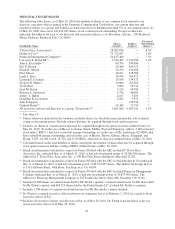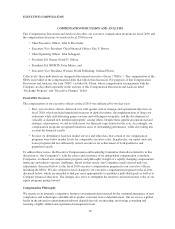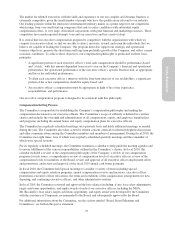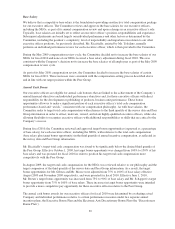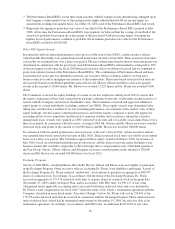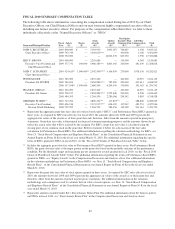Electronic Arts 2010 Annual Report Download - page 41
Download and view the complete annual report
Please find page 41 of the 2010 Electronic Arts annual report below. You can navigate through the pages in the report by either clicking on the pages listed below, or by using the keyword search tool below to find specific information within the annual report.
Proxy Statement
assistance of Ms. Toledano, set these performance objectives at the beginning of the fiscal year, and then
assessed Mr. Riccitiello’s performance against these individual objectives at the end of the fiscal year. The
Committee noted the Company’s achievements, under Mr. Riccitiello’s leadership, with respect to revenue in
light of an overall packaged goods sector decline, market share growth, improved game quality and executive
team development and retention. Though certain of Mr. Riccitiello’s individual performance objectives were
quantitative and financial in nature, there was no direct mathematical calibration of Mr. Riccitiello’s bonus
payment to these financial objectives. Rather, the Committee made a qualitative assessment of Mr. Riccitiello’s
achievements for each of his objectives in order to arrive at his cash bonus recommendation.
In May 2010, the Committee approved amendments to our Discretionary Bonus Plan for fiscal 2011, such that
bonuses awarded under the Discretionary Bonus Plan will be based on performance during the full fiscal year
ending March 31, 2011, with actual bonus payouts for employees (other than our CEO) determined based 20%
on the Company’s financial performance (based on non-GAAP revenue and non-GAAP earnings) measured
against pre-determined performance targets for the fiscal year and 80% on individual contributions and the
achievement of measurable business objectives, including, but not limited to, business unit financial and
operational performance metrics, such as profit and revenue goals where applicable. This structure is intended to
motivate employees by linking bonus awards directly to individual and team performance, while also giving the
Company more flexibility to appropriately reward exceptional individual performances. Our CEO’s bonus will
be determined based 65% on the Company’s financial performance, including non-GAAP Earnings Per Share,
non-GAAP Net Revenue and non-GAAP digital revenue, and 35% on individual contributions and the
achievement of measurable business objectives.
Equity Awards
An integral part of our compensation philosophy is to align the interests of our executive officers and our
stockholders by tying a significant portion of their total direct compensation to stock-based compensation. We also
believe that delivering a portion of their total direct compensation in the form of long-term equity awards helps
encourage a forward-looking long-term view in an industry that is subject to lengthy business cycles and short-term
volatility. Equity incentives such as restricted stock units also play an important role in our recruitment and
retention strategies, given that the competition for creative, technical and leadership talent in our industry is intense.
Executive officers are eligible to receive equity awards when they first join the Company, in connection with a
significant change in responsibilities, annually to provide incentives for continued performance, and
occasionally, to achieve internal parity between different executive positions or to meet retention objectives. The
target value granted to each executive officer is determined by the Committee, after considering a number of
factors, including the executive officer’s position and level of responsibility, his or her performance, the value of
equity awards for similar positions in the external market (as referenced by the 75th percentile in the survey data
and Peer Group information), and internal equity values among similarly-situated executive officers.
For fiscal 2010, the Committee targeted equity awards to our executive officers as a mix of stock options and
restricted stock units. In July 2009, the Committee adjusted the equity to be delivered from a mix of 70% stock
options and 30% restricted stock units to a mix of 50% stock options and 50% restricted stock units. As a result
of a comprehensive review of the Company’s compensation programs undertaken by the Committee in February
2010, the Committee determined that this equity mix was not achieving the intended objectives. Accordingly, in
order to further strengthen retention goals and promote a focus on the long-term performance and success of the
Company, the Committee decided to make equity awards to our executive officers, including our NEOs, solely in
the form of restricted stock units. This is consistent with the equity awards made to eligible non-executive
employees of the Company. The Committee believes that making equity grants in the form of restricted stock
units continues to align executive officer ownership of the company with stockholder interests, while also
providing important retention capability and market-competitive compensation.
Performance-Based Restricted Stock Units
In fiscal 2009, the Board, upon the recommendation of the Committee, granted performance-based restricted
stock units (“Performance-Based RSUs”) to certain executive officers, including the NEOs, with the intention of
33




